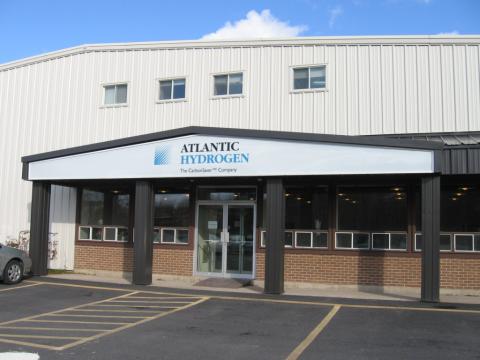Atlantic Hydrogen Inc., the Fredericton company whose technology extracted carbon from natural gas, has filed for voluntary bankruptcy and is searching for a buyer for its assets.
The company issued a statement Tuesday saying it was making the move pursuant to the Bankruptcy and Insolvency Act of Canada and had appointed Deloitte as the trustee for the proceedings. The AHI directors have resigned, and the management team and employees have been laid off.
“AHI still believes in the vast potential of the CarbonSaver technology,” said Chairman Bill Stanley in the statement. “Although progress has continued, we haven’t reached the point of the technology being commercially viable, which has limited our ability to attract additional funding. That’s why we feel this was the right thing to do.”
AHI was more than a decade old and had a large complex for an Atlantic Canadian startup. Its Fredericton headquarters housed one of the largest private R&D labs in the region, and it employed 30 people as of 2012, including 21 engineers and three PhDs.
The CBC reported Tuesday that the province of New Brunswick declined a request to increase its exposure to the company, having sunk $4.7 million into it in the past 13 years. AHI had also received money from the National Research Council and the Atlantic Canada Opportunities Agency, said the report.
As of late 2012, the company had raised $32 million in funding, including grants and loans from government.
AHI began as a vehicle to commercialize research carried out at the University of New Brunswick on a system designed to enhance the efficiency of natural gas. The technology separates carbon and hydrogen atoms at the molecular level from natural gas, breaking out carbon and leaving free hydrogen in the gas mix. The result is natural gas enriched with hydrogen, which means it burns more cleanly than standard natural gas.
AHI sought to commercialize the technology in two platforms. CarbonSaver P decarbonized natural gas using plasma science so the result was a cleaner form of natural gas. The second platform was CarbonSaver T, which extracted ``carbon black’’, an industrial product used for such tasks as strengthening the rubber in tires, from natural gas.
Early in 2012, Atlantic Hydrogen signed an agreement to build its first industrial-scale CarbonSaver facility at Emera’s Bayside electrical generating station near Saint John. The deal as announced included an equity investment worth more than $5 million from Halifax-based Emera.
The facility never went into production and in February 2014, Emera said it would write off its investment in AHI, which had grown to $8.8 million.
“It’s disappointing to take this step today, but we think the employees and many stakeholders of AHI have reason to be proud,” said Stanley. “While we were not able to take the idea all the way to commercialization, many people did tremendous work along this journey.”










